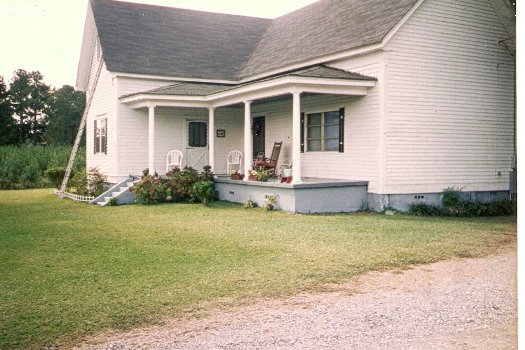GEORGIA ON MY MIND:FULKS VERSION
Dedicated to Bernard L. and Euphama Fulks Jackson, a brother-in-law and eldest sister.
An aftermath of one man's nap during March of a cooler than normal spring(2007) in
Illinois, I dream of Georgia in a different manner than the Ray Charles version. Among
my sleepy thoughts are of maypods, sister Euphama Fulks Jackson and her husband, Bernard L. Jackson of Round Oak, Georgia, President James Earl Carter and his spouse Rosamond, and walks during times long ago with the most
beautiful girl in the world along "Five Points And Firetower Road." No account of Georgia should omitt the importance of B.L. Jackson and his wife, Euphama Fulks Jackson. As an avid hunter, fisherman, and outdoorsman, B.L. was fit for survival. Georgia in summer is a hot, dry, and parched land. It can be difficult even for the wild creatures that live there.
Home of Bernard L and Euphama Fulks Jackson, this exquisite dwelling is located
in Round Oak, Georgia. Constructed prior to the American Civil War, it is one-quarter-mile from where was fought "The Battle of Sunshine Church."

No plans to visit Georgia are currently in the making. The people there will do well without me.(California is still there. I've seen them walking via the tube.) Yet, in a broader sense, this writer is there every day for a time.
If one is especially sensitive, he might see the one I loved and me walking those
red-clay roads or among the forests. Image if you can that turkey vultures circle an area in the distance and
tell where the predators have made a kill. You'd almost surely spot a brown thrush, a bluebird, or huge flock of crows or cowbirds. Rural Georgia is hardly ever a quiet place. The hounds and those native creatures are extremely talkative. You'd need an imagination at least equal to mine to spot two 1950's third graders there on Piedmont National Wildlife Refuge.(The two of us are not likely to be together in heaven. We often quarreled during that time, and the relationship eventually went completely flat.
she hailed from Des Moines, Iowa and moved to Georgia with her mother and a stepfather. At that time, she was an only child. I was an only son with four older sisters. Now fifty or more years later, this writer still breaks into fits of depression and oceans of tears from the ending of that relationship. Instead of taking all my medical prescription which would end it all, I simply return to those times and have a good time composing here. That the two of us should have even met was a chance encounter; not worthy of remembrance following my death.There'll be no markers or evidence that anything of note occurred there on Piedmont National Wildlife Refuge. I do want some of the highlights recorded and remembered, and sharing a few experiences in this manner shall result in no harmful consequences. Going back to Georgia each day is just a few finger-taps away. )
Sparsity of the population during the late 40's and early 50's allowed rural Georgians and Kentuckians a peace and protection not available to city dwellers. Less than five people per square mile resided in many rural areas. It was less that that for us on the wildlife refuges. My Iowa acquaintance and I stayed physically active.
When the summer heat index reached to 105F in the shade, we rode our bicycles for miles and miles. We would abandon those wheels and walk with perspiration on our brows. We were untiring in our pursuit of adventure, and we would often find it. Sometimes we'd be at an abandoned or burned-out homesite or a lake hidden deep in the forest. There were cemetaries-tombstones upset by treegrowth. A child might trip over a tin- bucket or a rusted washtub; a large piece of broken crockery or a shattered iron-stove somewhere. Within the Georgia forests were all kinds of things to find and see.
Part of what's keeping me out of Georgia are the sighting of lost, tire-treads on
HW75 before Atlanta. Spread
along that road, a driver may hold his breath in anticipation of having a traffic mishap from those road hazards. As one approaches Atlanta from north, there's the terrifying descent down a mountain
into Chattanooga. How good are the brakes on the semi-tractor-trailer rig behind me? How good are mine? Somewhere and sometime between the thoughts of "what's a maypod and a Tom Sawyer" are flashbacks of my last motorized tour of Illinois, Kentucky, Tennessee, and Central Georgia. Chances are that nobody cares, but I drove an '86 Nissan PU. Thinking of its two sets of sparkplugs (four exhaust and four intake) and how well the engine
operated up and down the mountains, I enjoyed reading the different license plates-
Ontario, Ohio, Missouri, New York, or whatever. I'd knowledge that most of those travelers were people worthy of respect. ( Troy and Alabama were alright.
Did not intend to anger any of the Trojans. You won't read anything more about your school. My site is for research into family history and for fun with computer. Best wishes to all of you.)
Bernard L. Jackson of Round Oak, Georgia- hunter, fisherman, adventurer, camper, and teller of wilderness stories was an interesting man to know. On one tour
of the pine forests there, the two of us visited cemetaries and old home sites. He shared with me the story of where two of his old-maid aunts once lived. That was interesting. Bernard and I discussed the 1920's and 1930's. Born in 1940, I assumed a listener's role for much of that time. He and I talked of life, death, epidemics; hard and good times. Both of us mentioned how we'd dream of
walking into different times- those times long gone; paying surprise visits to those people of the past. At one visitation site, Bernard brought to my attention the burial plot of a young
black boy entombed in a washtub. That child, a friend of Bernard's, had succumbed to one of the killer diseases of those times. That was a sad and humbling experience for both of us. We sensed that there had been been a saddened mother and father. A preacher had come and stood; reciting biblical verses. Life would have been difficult for that young
boy, but he would not have starved. There had been fruits and berries in season, turkeys and chickens, wildgame, the hogs and a cow; maybe a mule and plow and the things that grew in the garden; the love and charity those who shared the land around them.
That walk in the woods of Georgia would have lasted a couple of hours longer. This writer trod carelessly though nests of yellowjackets. Those didn't sting Brother-in-law Bernard L. Jackson, but they did me. Not all the bees stung me, but
I know that at least a dozen did. My head, arms, and hands were exposed. The yellowjackets stung me where-ever and as often as they could. Retreating to the shelter of Bernard's pickup, the bees continued to pursue me into the cab. Its windows were down which I rolled-up. Suffering no permanent damage or serious swelling, we returned to Bernard's home in Round Oak. This writer made a rapid recovery.
Tom Sawyer by Samuel Clemens was one of Doug Eadie's birthday gifts from his
parents. Doug then gave that book to me. As that fourth-grade boy opened the book and focused on a wide view of "the
Great Okefenokee Swamp", this writer detected a state of contempt and fear within his eyes. "Here George," he said. "I got this as a birthday present. You can have it." Reading that book was a three day adventure. Recognizing Aunt Polly, Sidney, Becky Thatcher, Muff Potter, Injun' Joe, and Huckleberry immediately, it was easy to identify with those people. I've encountered them in many different places. There are many things universal in the development of human personality; partly from background, culture,
and experience.
As a river boat pilot on the Mississippi River, author Mark Twain (Samuel Clemens) had time to think clearly and compose. He was excellent.
Forty miles east of "the mighty Mississippi" as Mark Twain navigated it is the
home of this writer in Hillsboro, Illinois. A recent visit to Argoscy Casino, and a daughter and I stood admiring the gateway- the point where Lewis and
Clark crossed for their survey of the North American continent. As for the name Finn, that daughter married a descendant of Huckleberry. Her oldest son goes by the
name of Austin Finn. He's to be a freshman at Litchfield Highschool for 2009-10. Unlike his Hannibal, Missouri ancestor, he attends school on a regular basis.
Continue here June 15,2009.
Continue here on August 9,2009.

To discuss sensations, images from the Hubble Telescope come near the ultimate in experience. Those photos make one feel as if the end results of brain functions amount to trivia. Created herein are "open ends" to enjoy. The results of such brain functions seem to amount to
trivia. In many cases, so may the lives and events that life species experience on
Earth. Maybe each of us is a "star" for just a breath and a sigh.
In order to share my conception of time, I must communicate how I feel about the past and times passing. Time's passing seem to be a union of senses.
Since there exists no interval to separate the past, present, and future, all that
conscious creatures experience are sensations. While this writer tends to be "agnostic," I offer
some credibility to one of the biblical concepts of "The Old Testament." That is also the belief of Mr. Thomas Chesser, owner of Chesser Island. "The book of life is
completed from beginning to end. I can't change any of it," Tom Chesser said."I can
only pray that the story has been written in a manner that will not be disasterous to my family, friends; and me."
How We Loved Maypods
During the oven-like and sweltering heat of those Georgia summers, the maypods appear, slowly develop, and ripen. It's a long, slow, and somewhat miraculous process; the work of a master scientist, no-doubt. Beginning as a vine that clasps and hugs that red earth in rural Georgia; and spreading along the sides of red-clay roads , their name may be a colloquialism. Those fruits may grow in other locations,
but Jones County Georgia is where I found them. Much as the vines of a pumpkins, yellow blooms emerge during late spring. From those blooms come green, egg-shaped pods in great numbers; very similar to a paw-paw. The texture of the may-pod is quite different in appearance and taste of the latter.
After a time
the pods produce seeds and later a moist jelly inside those pods. Collapsing, slowly cooking, withering, and wrinkling and drying, those maypod
fruits will turn yellow in the relentless sun. As the pods dry, flatten, turn yellow, and lay there, ripened maypods would seem a useless thing. The tasty fruit inside the "maypod" is preserved until its skin is broken. Inside the pod is a delicacy with a delicious taste and an instant burst of energy; reviving one much as the injestion of a handful of huckleberries, blueberries,
blackberries or apples. The wild animals love their taste. This writer and B.L. Jackson shared love of maypods.

|